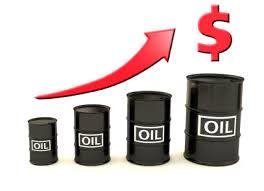Rise In Oil Prices As U.S. Drilling Declines
 Oil rose by more than 1 percent on Monday after data showed U.S. drilling slowed and a report said $1.5 trillion worth of planned production was uneconomic at current prices.
Oil rose by more than 1 percent on Monday after data showed U.S. drilling slowed and a report said $1.5 trillion worth of planned production was uneconomic at current prices.
Crude has halved in value over the last year as soaring global production overwhelmed slowing demand and the much lower prices have now begun to hit drilling, particularly in the United States.
U.S. drillers have cut the number of rigs in operation for three straight weeks.
Global benchmark Brent crude oil LCOc1 was up 60 cents at $48.07 a barrel by 0315 EDT. U.S. crude oil futures CLc1 were trading at $45.38 per barrel, up 70 cents.
“The fall in rig counts (is) supporting an otherwise bearish market,” said Tamas Varga, oil analyst at London brokerage PVM Oil Associates.
Investment bank Goldman Sachs said in a report that rig data pointed to a decline in U.S. oil production between the second and fourth quarters of this year of more than 250,000 barrels per day (bpd).
Analysts said low prices would have a bigger impact in the longer term as U.S. producers struggled to cut enough costs.
“While operators are seeking an average cost reduction of 20-30 percent on projects, supply chain savings through squeezing the service sector will only achieve around 10-15 percent on average,” energy consultancy Wood Mackenzie said.
“$1.5 trillion of uncommitted spend on new conventional projects and North American unconventional oil is uneconomic at $50 a barrel,” Woodmac added.
Despite such a cut to U.S. spending plans, analysts said prices were expected to remain at low levels for some time as other producers, especially in the Middle East and Russia, kept pumping near record levels.
“Oil producers continue to battle for market share … widening the global oil surplus,” ANZ said on Monday.
The bank said it expected U.S. crude to fall below $40 a barrel over the next six months and to average just $41 next year. It expects Brent to average $46 per barrel in 2016.







